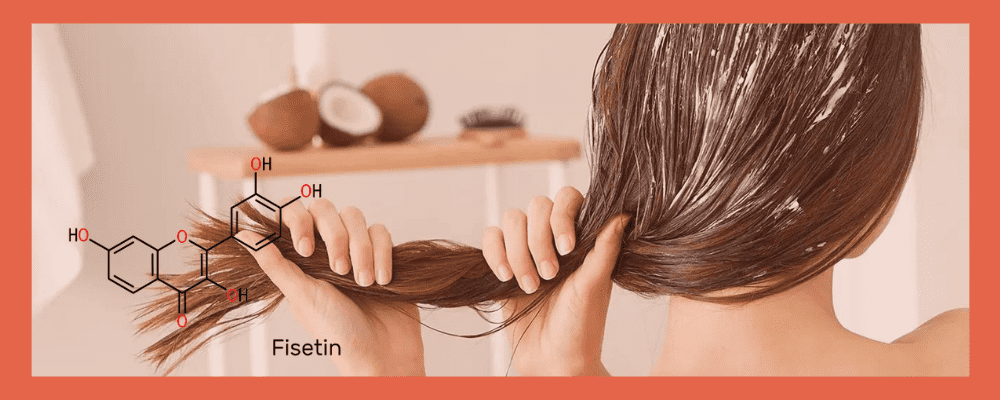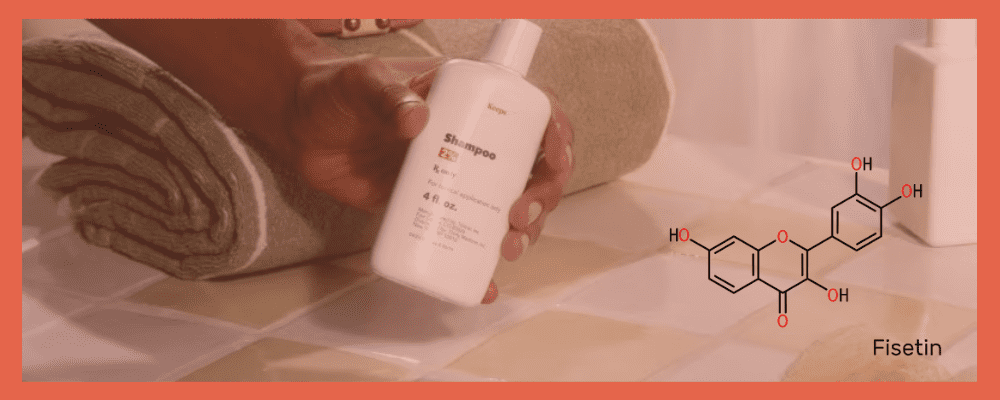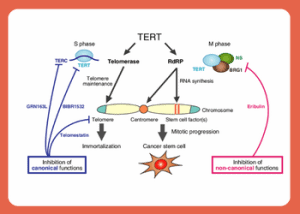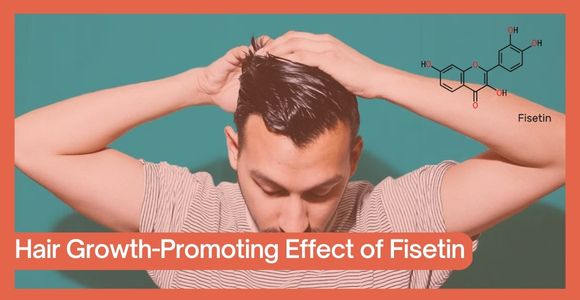Fisetin is a powerful flavonoid found in many types of fruits and vegetables, from strawberries to grapes. It has been investigated for its antioxidant capabilities as well as anti-inflammatory and neuroprotective properties that can help improve overall health. Notably, fisetin may even support hair growth; something countless individuals worry about due to the potential consequences it can cause on their physical appearance and self-confidence.
Uncover the hidden potential of fisetin and its possible impacts on hair growth with this article! Studies have shown that it could potentially nurture hair health, promoting new growth and preventing loss. Our exploration into science-backed evidence will provide you with an insight into how to make fisetin a part of your own personalized hair care routine.
Table of Contents
Overview of the Hair Growth-Promoting Effects of Fisetin
There have been multiple studies displaying the potential for Fisetin to support hair growth:
- Stimulating hair growth: Astonishingly, studies have uncovered that Fisetin can not only enhance the progression of hair follicles but also augment the number of strands.
- Preventing hair loss: By inhibiting the activity of certain enzymes, Fisetin could potentially help to stop hair loss.
- Improving hair quality: Fisetin has the potential to not only improve hair quality but also strengthen and thicken each individual strand.
- Reducing scalp inflammation: Taking advantage of its potent anti-inflammatory properties, Fisetin can help reduce the inflammation that often occurs on the scalp and thereby support healthy hair growth.
- Promoting healthy blood flow: it has been shown to foster healthy hair growth by providing nourishment to the scalp, thus improving blood circulation and stimulating the follicles.
- Boosting Hair growth hormones: it has also been proven to stimulate the production of certain hormones known for encouraging hair growth.
It’s essential to realize that the research conducted on fisetin and hair growth is hopeful, yet more investigation must be done to completely grasp its outcomes and potential use as a stimulant for hair growth.
The combination of resveratrol and fisetin can be a real game-changer for your hair. Not only does it shift the dormant phase to a growth cycle, but also stimulates stem cells on the follicles in order to promote quicker and more efficient hair growth. These results suggest that resveratrol and fisetin induce a shift from telogen to anagen in the hair follicle by inducing proliferation of hair follicle bulge stem cells, thus promoting hair growth.
How to Incorporate Fisetin into Your Hair Care Routine

It is crucial to be aware that, while the effects of fisetin, quercetin, and resveratrol on hair growth are yet to be fully explored, consulting a medical expert before adding any supplement or product to your haircare routine is highly recommended.
Before taking any supplement or utilizing a product that promises to enhance hair growth, it’s best to consult with your healthcare provider due to the limited research on quercetin, resveratrol, and fisetin.
Though there have been studies done in this area, more investigation is essential before we can understand the true potential of these compounds for promoting hair development.
There are several ways to incorporate fisetin into your hair care routine:
- Eating fisetin-rich foods: Boost your body’s fisetin levels and combat hair loss with the help of healthy, delicious foods like strawberries, apples, persimmons, grapes, onions, and kiwi fruit. Incorporating them into your diet regularly can promote successful hair growth in no time!
- Taking fisetin supplements: When exploring the options of fisetin supplementation, there is a variety of forms to choose from including capsules, tablets, powder, and liquid drops. If you wish to begin taking this supplement it is important that you consult with your healthcare provider in order to determine what dosage will be best suited for you as well as ensure that it does not interact with any medications currently being taken.
- Using topical fisetin products: Treat your tresses to the power of fisetin-based hair care products with an array of shampoos, oils, serums, sprays, conditioners, and masks. Whether you use them separately or all together as part of a regular routine – these amazing hair-enhancing products offer visible results in no time!
Several plant extracts promote hair growth by regulating the expression of hair-growth-related cytokines. Thanks to their natural compounds, these plant extracts can assist in the equilibrium of proteins within the body that are responsible for activating hair growth. This mechanism works by stimulating individual follicles and augmenting the hairs produced. Consequently, this results in long-lasting fuller looking locks!
Not only can these compounds help prevent hair loss by hindering the action of enzymes that trigger it, but they may also stimulate growth. By taking advantage of plant extracts to manage cytokines related to hair growth, you could have a critical addition to your haircare routine.
Recommendations for Using Fisetin for Hair Growth
Fisetin has been found to significantly promote exosome secretion from HaCaT cells, which are a type of skin cells. Research suggests that fisetin as Coq10 can provide skin health benefits, as exosomes display both anti-inflammatory and anti-aging effects.
Exosomes also help with cell communication and tissue regeneration, indicating the potential for fisetin to bolster skin health. To further comprehend its role in exosome secretion and influence on skin wellness though, more studies are necessary.
| Recommendations | Explanation |
|---|---|
| Incorporate fisetin-rich foods into your diet | Superfoods such as strawberries, apples, persimmons, grapes, onions, and kiwi fruit are packed with fisetin – a compound that has been found to promote hair growth and protect against hair loss. By integrating these foods into your diet regularly you can ensure that your body is getting the necessary intake of fisetin for healthy-looking hair! |
| Consult with a healthcare professional before taking fisetin supplements | Fisetin supplements are available in a range of forms including capsules, tablets, powder, and liquid drops. To ensure you take the correct dosage for your needs as well as to check that it does not interact with any medication you happen to be taking, it is important to seek advice from a qualified healthcare professional. |
| Use topical fisetin products | With so many fisetin-based hair care products on the market, like shampoos, serums, oils, masks, and conditioners–it’s easy to incorporate them into your regular beauty routine. Make each day luxurious with a few of these high-quality products designed specifically for beautiful locks! |
| Combine methods | To optimize the results of fisetin, it’s suggested to combine consuming foods that are abundant in this nutrient, taking a supplement dose, and applying topical products. |
| Be patient | Patience is key when it comes to incorporating fisetin into your hair care routine, as the effects that this polyphenol has on hair growth may not be visible right away. However, by using fisetin regularly, you can certainly look forward to long-term results! |
Potential Side Effects and Precautions

Fisetin may come with certain risks or side effects when administered for hair growth, so it’s important to understand the potential dangers and take necessary precautions:
- Allergic reactions: If you are allergic to fisetin, it is possible that adverse reactions could occur – such as hives, itching, and difficulty breathing. In the event of any of those symptoms manifesting, discontinue use immediately and contact a doctor right away.
- Drug interactions: It is essential to check with a healthcare practitioner before taking fisetin, as it may interact with some medications such as blood thinners. Taking the proper precautions can help ensure everyone’s safety and well-being.
- Pregnancy and breast-feeding: Due to the lack of studies on fisetin in pregnant and breastfeeding women, it is recommended that these individuals avoid utilizing this compound.
- Dosage: Adhering to the recommended dosage of fisetin is paramount as overconsumption may induce undesirable consequences.
- Not suitable for everyone: Fisetin may not be the best choice for everyone, especially those with medical conditions or taking certain medications. If you’re considering fisetin to promote hair growth, make sure to first consult a healthcare professional.
- Limited studies: While research on fisetin and hair growth is still in its infancy, the evidence we have so far indicates that it could be a powerful agent for promoting healthy hair growth. However, more studies are necessary to uncover its full capabilities and possibilities.
Scientists found that RSV has promoting effects in hair growth and prolongs anagen phase of hair follicle from accelerating anagen entry and delaying catagen progression.
RSV’s low concentration can influence the growth of DPCs and guard them from oxidation, but more research is necessary to understand RSV’s role in hair follicle regulation. Consequently, RSV could soon become a popular remedy for preventing as well as treating baldness.
Frequently Asked Questions
What Stimulates Growth of Hair Follicles?
Several factors can stimulate the growth of hair follicles, including:
- Hormones: Testosterone, estrogen, and DHT are hormones that have a tremendous impact on hair growth. Such hormones control the regrowth cycle of your tresses while promoting their further development through new follicles formation.
- Blood flow: For healthy hair, it’s vital to maintain a consistent flow of blood and oxygen to the scalp. The nourishment provided by these elements is essential for the growth of new hairs at each follicle.
- Genetics: Genetics play a significant role in determining the rate and fullness of hair growth; some are blessed with naturally thicker, fuller locks than others.
- Diet: Eating a balanced diet abundant in vitamins and minerals, with an emphasis on vitamins C, D, iron, and zinc can help stimulate hair growth.
- Scalp care: Nurture your scalp with essential care, like keeping it clean and exfoliating away the dead skin cells. This can clear out hair follicles to allow for more healthy growth of tresses.
- Medications: If you’re looking for a way to promote hair growth, there are several medications that may be of assistance. Minoxidil, finasteride, and biotin supplements can all help stimulate new hair follicles and encourage healthy strands.
- Topical agents: Several topical remedies such as fisetin and quercetin, resveratrol, caffeine, Saw palmetto, and others have been scientifically proven to increase hair growth by controlling the expression of relevant cytokines.
How Do I Activate My Hair Growth Hormones?
An optimal diet can optimize hair growth by offering required nutrients such as vitamin D, zinc, and iron. Additionally, regular physical activity boosts blood flow to the scalp which nourishes the follicles and stimulates hair development. Exercise is an effective way to help combat stress that can lead to hair loss.
To further reduce your levels of stress, meditation, yoga or therapy are all proven practices that aid in managing anxiety and minimizing hair fall. Sleep is essential for both physical health and hair growth. Quality shut-eye can help to reduce stress levels, which in turn boosts healthy hair production.
 Additionally, various supplements such as biotin and saw palmetto supply the nutrients necessary for optimal scalp development. Still, it’s recommended to contact a healthcare specialist prior to consuming any supplement—just in case!
Additionally, various supplements such as biotin and saw palmetto supply the nutrients necessary for optimal scalp development. Still, it’s recommended to contact a healthcare specialist prior to consuming any supplement—just in case!
Applying topical agents like resveratrol, fisetin, quercetin, Saw palmetto and caffeine has- been proven to stimulate hair growth by controlling the output of related cytokines.
Enhanced telomerase reverse transcriptase (TERT) levels in dermal keratinocytes can serve as a novel target for hair growth promotion.
By enhancing TERT levels, the hair growth stage can be extended and fresh locks may flourish. This breakthrough could pave the way for new therapies that focus on increasing TERT in dermal keratinocytes.
Furthermore, investigations into this domain have the potential to shed light upon what triggers balding as well as how more successful treatments against alopecia can be developed.
Get professional advice from your doctor or healthcare provider before making any alterations to your diet, exercise regimen, or taking dietary supplements. This will guarantee that the changes you make are safe for you and do not interfere with any medications currently being taken by you.
Frequently Asked Questions
What Peptides Increase Hair Growth?
Several peptides have shown promise in promoting hair growth and reducing hair loss. These peptides work by stimulating hair follicles, improving blood flow, and supporting hair growth processes. Here are some of the key peptides known for their potential benefits in increasing hair growth:
- Copper Peptides: Copper tripeptide-1, a combination of copper and amino acids, has been found to enhance hair follicle size and stimulate hair growth.
- GHK-Cu: Another copper peptide, GHK-Cu, has demonstrated the ability to promote hair follicle proliferation and improve hair growth.
- Biotinoyl Tripeptide-1: This peptide targets hair follicles and has been shown to increase hair thickness and density.
- Acetyl Tetrapeptide-3: Known for its hair follicle-stimulating properties, this peptide can help extend the hair’s growth phase and reduce hair loss.
- Palmitoyl Tetrapeptide-20: This peptide is believed to enhance blood circulation around hair follicles, supporting nutrient delivery and promoting hair growth.
- Myristoyl Pentapeptide-17: Often found in eyelash and eyebrow growth products, this peptide has been studied for its potential to promote hair growth as well.
While these peptides have shown promising results in some studies and hair growth products, individual responses may vary. It’s essential to consult with a dermatologist or a healthcare professional before using any hair growth products containing peptides to determine their suitability for your specific hair loss concerns and overall health.
What Effect Do Polyphenols Have on Hair?
Polyphenols, a group of bioactive compounds found in various plant-based foods, have shown positive effects on hair health and growth. These natural antioxidants have been studied for their potential to combat oxidative stress and inflammation, both of which can contribute to hair damage and hair loss.
Polyphenols have been found to promote hair growth by stimulating hair follicles and increasing the anagen (growth) phase of the hair cycle while decreasing the telogen (resting) phase. One of the well-studied polyphenols in this regard is epigallocatechin-3-gallate (EGCG), found abundantly in green tea.
EGCG has demonstrated the ability to inhibit the activity of 5-alpha reductase, an enzyme involved in the conversion of testosterone to dihydrotestosterone (DHT). High levels of DHT can lead to hair miniaturization and eventual hair loss in individuals genetically susceptible to androgenetic alopecia (male/female pattern baldness).
Additionally, polyphenols possess anti-inflammatory properties that may help alleviate scalp conditions and improve overall hair health. By neutralizing free radicals and reducing inflammation, polyphenols can protect hair follicles from damage and preserve their function.
Consuming a diet rich in polyphenols, such as those found in green tea, berries, nuts, and fruits, may support hair health and growth. Moreover, the topical application of polyphenol-rich extracts or using hair care products containing polyphenols can also provide beneficial effects on hair and scalp conditions.
While polyphenols show promising potential in promoting hair health, it’s essential to remember that hair loss can be caused by various factors, including genetics, hormonal imbalances, and medical conditions. If experiencing significant hair loss or scalp issues, consulting a dermatologist or healthcare professional for a comprehensive evaluation is recommended to address underlying causes and develop an appropriate treatment plan.
Conclusion
To sum it up, a wholesome lifestyle is essential to promoting hair growth. Eating healthy foods that are packed with nutrients such as vitamin D, iron, and zinc can help provide the vital elements necessary for growing luscious locks. Exercising can increase blood flow to the scalp which nourishes your hair follicles while managing stress levels and getting adequate restful sleep will also improve the overall wellness of your mane.
Furthermore, incorporating fisetin, quercetin, resveratrol, caffeine, and Saw palmetto into your diet has been demonstrated to stimulate hair growth by influencing cytokines that govern the development of hair. Before you adjust your lifestyle or begin taking any supplements though, it’s wise to check with a qualified healthcare professional for guidance on what is safest and most beneficial for you.
To promote hair growth, stemoxydyne offers a proven and effective solution – however, it is always wise to discuss options with your healthcare professional before taking the plunge. This product guarantees increased density, and thickness, as well as overall stronger and healthier-looking hair.
